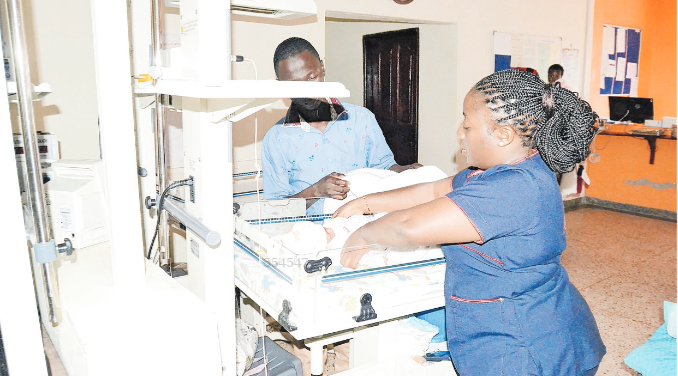Prime
Oyam women stranded with babies fathered by Chinese

A woman holds her granddaughter who was fathered by a Chinese national working at Karuma hydropower dam. PHOTO BY TOBBIAS JOLLY OWINY
What you need to know:
- Mr Simon Kasyate, the UEGCL corporate affairs manager, said petitioning Sino hydro Power Company over the fate of fatherless children may not yield fruits.
The Kamdini Sub-county LC3 chairperson, Mr Sam Ogwang Alunyu, says they have documented a total of 20 children in the sub-county that were fathered by Chinese employees at Karuma hydro power project. - Dr Richard Nam, the Lango Cultural foundation premier, says they are planning to negotiate with the management of Sinohydro Construction Company on how the women can be supported.
KIRYANDONGO/OYAM. Several women in Oyam District are struggling to raise children sired by Chinese nationals after the fathers abandoned them.
The Chinese nationals, who fathered the children, are employees of Sinohydro Construction Company that is constructing Karuma hydropower dam.
Work on the Shs2.2 billion hydropower plant started in 2013.
The project is expected to be completed by the end of 2018.
Ms Jacqueline Adero, 20, a resident of Arukolong, Zambia Parish, Kamdini Sub-county, Oyam District, is one of the women struggling to raise the children. Adero says a Chinese national identified only as Yahang, fathered her one-and-a half-year-old daughter.
She recounts that in 2015, she went to Karuma to look for a menial job but ended up in a relationship with Yahang who promised to marry her and take her to China.
Ms Adero’s hopes to marry Yahang soon faded when she realised that her boyfriend was returning to china without her. Five months pregnant and unable to work anymore, Ms Adero returned to her village in frustration.
“I couldn’t believe he was returning to China for good yet I carried his five-month pregnancy at the time and I just returned home in disappointment to manage my pregnancy, broke as I was,” she narrates.
Ms Sophia Kolo, Adero’s mother, says attempts to find out who was responsible for the pregnancy was futile until Adero delivered at Aber hospital a year ago.
“We asked about it in vain, not until the clan council sat her down, but she only said it was a fellow worker from Mukono. But we were shocked finally when she delivered a Chinese baby girl,” Ms Kolo says.
Adero’s mother adds that it is difficult to raise the mixed race child because of allergy to local foods.
“She only feeds on biscuits and soft drinks and when we serve her local dishes, he develops rashes all over her body,” Ms Kolo says.
Mr Alfred Kolo, Adero’s father, says Sinohydro Company should intervene and link them with their granddaughter’s father.
“I am just a peasant and unable to raise all that it takes to bring up this child. It is very expensive to treat her medically and feed her considering the diet she requires. This is why her real father has to come in and support,” he adds.
The chief of Mwa Otiratok clan in Kamdini Sub-county, Mr Patrick Okello, says they will file a formal complaint with Sinohydro management.
“We have a law in our culture which demands that you either marry that girl or compensate for damages and time lost because of the pregnancy and it is on this basis that we will demand the company to produce these workers who have abandoned our daughters with their children,” Mr Okello says.
However, Dr Richard Nam, the Lango Cultural foundation prime minister, says they are planning to negotiate with the management of Sinohydro Construction company on how the women can be supported.
“It is our culture that once you impregnate our daughter and decline to marry her, you pay compensation for damages and upkeep of your offspring. This is what we want to make clear to them when we engage them in negotiations,” Dr Nam says.
He adds: “They (Chinese) should help these poor girls to raise these children. We shall sit and negotiate with them, but when this fails, legal measures will be taken.”
When this newspaper contacted Synohydro, they referred us to Uganda Electricity Generation Company Limited (UEGCL).
Mr Simon Kasyate, the UEGCL corporate affairs manager, said petitioning Sino hydro Power Company over the fate of fatherless children may not yield fruits. “Sex at Karuma is being traded on the basis of willing buyer and willing seller. These girls knew that these Chinese nationals have a lot of money that they would milk,” he says.
The Kamdini Sub-county LC3 chairperson, Mr Sam Ogwang Alunyu, says on several occasions, they have written to the Ministry of Gender, Labour and Social Development to intervene but they have received no response.
He says they have documented a total of 20 children in the sub-county that were fathered by Chinese employees at Karuma hydro power project.
Mr Alunyu says cases of prostitution and defilement has increase.
“The level of sexually transmitted infections has increased because young girls and married women are trading sex and this has resulted into divorce, domestic violence, and many other crimes,” he says.
Plans. Dr Richard Nam, the Lango Cultural foundation premier, says they are planning to negotiate with the management of Sinohydro Construction Company on how the women can be supported.




